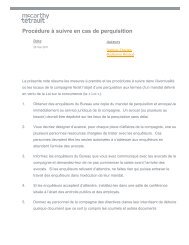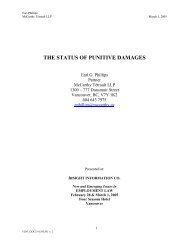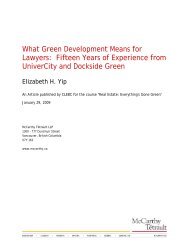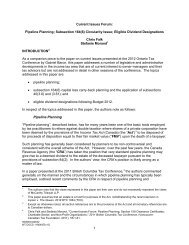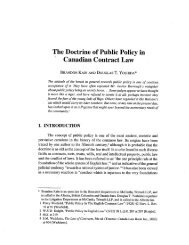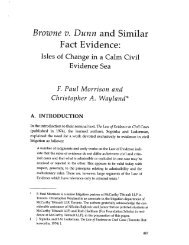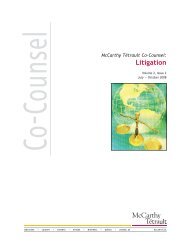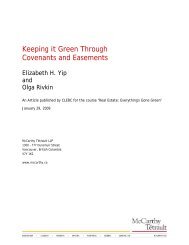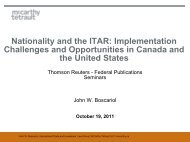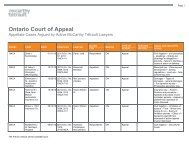1. COMPETITION - McCarthy Tétrault
1. COMPETITION - McCarthy Tétrault
1. COMPETITION - McCarthy Tétrault
Create successful ePaper yourself
Turn your PDF publications into a flip-book with our unique Google optimized e-Paper software.
of phone traffic data for use in crime assessment and prevention and<br />
introduces new dispositions concerning the privacy of the parties to a legal<br />
proceeding.<br />
Finally, the Code includes a regime of detailed new safety measures<br />
intended to safeguard databanks. The different measures are divided into<br />
three categories: dispositions applicable to processing with electronic<br />
instruments; dispositions to protect sensitive information or judicial acts;<br />
and minimum measures for all kinds of data processing.<br />
For more information visit: www.garanteprivacy.it<br />
or please contact: f.cugia@lexjus.com<br />
12. TARIFFS<br />
UK<br />
POLICY STATEMENT FOLLOWING REVIEW OF TWO-<br />
PART CHARGING<br />
The Director General of Telecommunications has concluded his review<br />
into the feasibility of establishing a system of two-part charging for<br />
wholesale interconnection and issued his final statement on 1st September<br />
2003.<br />
The Director General has concluded that the introduction of two-part<br />
charging is not appropriate in light of the costs and uncertain benefits it<br />
offers.<br />
Two-part charging involves the levying of separate tariffs for the setting up<br />
of a call (call set-up) and the maintaining of the connection for the duration<br />
of the call (call duration). Currently, BT averages the cost of both of these<br />
elements of call interconnection and charges a single, blended rate, levied<br />
on a pence per minute (PPM) basis.<br />
The issue of two-part charging has been considered by OFTEL on a<br />
number of occasions during the period since 1999. It was argued that twopart<br />
charging provided a more efficient means of aligning cost recovery for<br />
each call against its cause.<br />
In the consultation document, Policy review of two-part charging, issued in<br />
January 2003, the Director General indicated that he would only consider<br />
adopting two-part charging if the benefits of the approach significantly<br />
exceeded the direct costs of implementation.<br />
However, the Director has determined that, in fact, the potential costs of<br />
developing, implementing and maintaining a system to account for two-part<br />
charging would exceed the benefits likely to result to consumers, and<br />
would add a further burden on OFCOM at a time of considerable<br />
regulatory change.<br />
The Director General also considered that several of the proposed benefits<br />
of two-part charging were uncertain, including whether any resulting<br />
benefits would flow through to the retail level and uncertainty about the<br />
proper split between the call set up and duration components of the<br />
charge.<br />
For these reasons, the Director General concluded that it was not clear<br />
that any potential benefits of two-part charging, which would be derived at<br />
the wholesale level, would outweigh the costs of setting up and monitoring<br />
this approach, which BT estimated at approximately £5 million over the<br />
next five years.<br />
For more information please contact: colin.long@olswang.com<br />
13. TAX<br />
BRAZIL<br />
ISS ON IP-RELATED SERVICES<br />
On 1st August 2003, Supplementary Law No. 116 came into force in Brazil,<br />
and amended the current regulations on the Tax on Services (the "ISS").<br />
Besides adding several services to the list of ISS triggering events,<br />
Supplementary Law 116/03 establishes that the ISS will be levied on all<br />
services rendered to Brazilian entities, even if such services are fully or<br />
partially provided abroad. Where services are rendered abroad, the ISS will<br />
be paid by the principal instead of the service provider.<br />
Accordingly, the ISS may be assessed at a rate of up to 10% on services<br />
rendered by a foreign entity to a Brazilian company in the following areas,<br />
among others: information technology; licensing and assignment of rights<br />
to use software or trademarks; agency of industrial property, artistic, and<br />
literary rights; photographic, phonographic, and cinematographic work;<br />
technical and administrative assistance, even where it involves the<br />
assignment of personnel or technicians to Brazil; franchising; press<br />
agency, journalism and public relations; and art work.<br />
For more information please contact: rapdecunto@pinheironeto.com.br<br />
INDIA<br />
MAINTENANCE OF PCS NOT SUBJECT TO SERVICE<br />
TAX<br />
The Ministry of Finance (the "Ministry") has issued a series of notifications<br />
to clarify the scope and taxability of some of the new services that have<br />
been brought within the service tax net. The Indian industry had been<br />
anxious about the scope of these new services, and hence representations<br />
were made to the Ministry to obtain clarity on the same. Some of the<br />
important clarifications are discussed hereunder.<br />
From 1st July 2003, maintenance or repair services under contracts<br />
became subject to service tax at the rate of 8%. Pursuant to the bid made<br />
by Indian corporations, the Ministry has, in public interest, exempted<br />
maintenance and repair of computers, computer systems, and computer<br />
peripherals from the levy of service tax by Notification No. 20/2003, dated<br />
21st August 2003. Clearly all IT companies engaged in maintenance and<br />
repair services will benefit from this decision.<br />
Additionally, the Ministry has also made it clear in Circular No. 62/11/2003,<br />
dated 21st August 2003, that maintenance or repair services (other than<br />
maintenance and repair of computers, computer systems, and computer<br />
peripherals) rendered prior to 1st July 2003 will not be taxable irrespective<br />
of when the bills are raised or payments are made.<br />
The Ministry clarified under a separate Notification No. 19/2003, dated 21st<br />
August 2003, that in the case of the new category of service<br />
"commissioning or installation of plant, equipment, or machinery," where<br />
there is a turnkey contract - involving commissioning or installation along<br />
with supply of plant, machinery, or equipment - the assessee will have the<br />
option to pay the service tax either on 33% of the gross amount charged,<br />
or on the actual amount of service fee billed to the client.<br />
The Ministry also clarified by Notification No. 20/2003, dated 21st August<br />
2003, the scope of IT service under business auxiliary service. Thus, any<br />
service of back office processing that primarily relates to the operation of a<br />
computer system will be considered as IT services and will be exempt from<br />
ISSUE 22 SEPTEMBER – OCTOBER 2003 11



